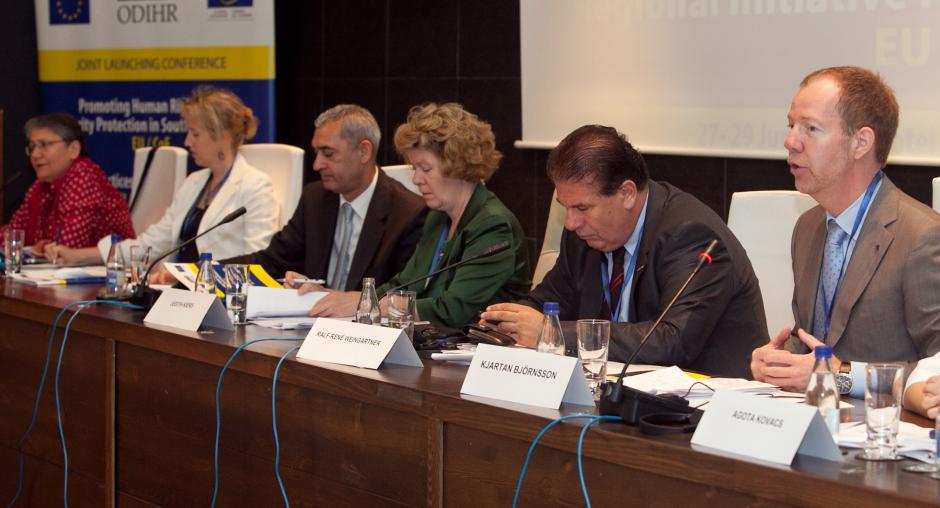European Union, Council of Europe and OSCE/ODIHR launch three regional projects to improve situation of minorities and vulnerable groups in Western Balkans

The European Union, the Council of Europe and the OSCE Office for Democratic Institutions and Human Rights (ODIHR) jointly launched three projects to promote minority integration in the Western Balkans at an event in Budva, Montenegro, which took place from 27 to 29 June 2012.
The joint launch event allowed the beneficiaries of the projects “Best Practices for Roma Integration”, implemented by ODIHR and OSCE field operations, “Promoting Human Rights and Minority Protection in South East Europe” and the “Regional Initiative for Inclusive Education”, both implemented by the Council of Europe, to familiarize themselves with the projects and the European Union’s regional framework for co-ordination in the field of minority integration in the Western Balkans.
Speaking at a press conference on 29 June, representatives from the EU, the Council of Europe and ODIHR stressed their organizations’ commitment to helping improve conditions for minority communities and vulnerable groups through an integrated and co-ordinated approach.
State Secretary of the Foreign Ministry of Montenegro, Nebojša Kaludjerović, underlined how significant it was for the countries in the region to clearly understand that the issues of fundamental human rights, their promotion and protection should not be perceived in a narrow national context.
“Participating in these projects we all confirm our commitment to treat the issues of Roma population, promotion and protection of human and minority rights and support for inclusive education from the regional perspective, in order to achieve widely applicable solutions,” Kaludjerović said.
Director General Gabriella Battaini–Dragoni, (Deputy Secretary General elect) of the Council of Europe, stressed the need for communication among the three organizations and national stakeholders, and pointed out that issues covered by the three projects were strongly inter-related.
“Minority protection and promotion, the rights of the specific Roma minorities, and inclusive education are various branches of a wider issue,” Battaini–Dragoni said. “We are proposing that we move away from a project mentality that does not take sufficient account of the breadth of the issues.”
“The situation of minorities and vulnerable groups is particularly difficult in a region that has witnessed armed conflicts, political transformations and economic transition in the last 20 years”, said Alberto Cammarata, Acting Head of the Delegation of the European Union to Montenegro. “I am convinced that the intervention should reach out to these vulnerable groups so that their situation can be ameliorated in a tangible way, through their involvement and with no further delay. Fulfilling this objective is also key to the success of the EU's enlargement policy overall.”
“The tasks are clear: evaluating, testing and sharing existing good practices that are effective in providing tangible solutions to challenges this region faces” said Andrzej Mirga, Senior Adviser on Roma and Sinti Issues at ODIHR. “The exchange of concrete best practices will also help more efficient implementation at national level. Moreover, regional co-operation could serve as a catalyst for enhanced performance in boosting the necessary reforms, and additional strategic and systematic approaches may emerge at this level to feed processes steered by local stakeholders.”
A regional approach designed to complement efforts at the national levels was chosen for the three projects based on common social, political and economic contexts and problems in the Western Balkans, as well as in the light of the common challenges and objectives the countries share ahead of EU accession processes.
The three projects, with funding from the European Union and co-funding from the Council of Europe and OSCE participating states, will be implemented in the coming two to three years and help connect governments, civil society and other stakeholders in the region to work together on enhancing the integration of minority communities.
